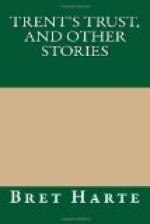Nevertheless, something must be done: he must try to find the man; still more important, he must seek work before this dubious loan was further encroached upon. He restrapped the portmanteau and replaced it under the table, locked the door, gave the key to the office clerk, saying that any one who called upon him was to await his return, and sallied forth. A fresh wind and a blue sky of scudding clouds were all that remained of last night’s storm. As he made his way to the fateful wharf, still deserted except by an occasional “wharf-rat,”—as the longshore vagrant or petty thief was called,—he wondered at his own temerity of last night, and the trustfulness of his friend in yielding up his portmanteau to a stranger in such a place. A low drinking saloon, feebly disguised as a junk shop, stood at the corner, with slimy green steps leading to the water.
The wharf was slowly decaying, and here and there were occasional gaps in the planking, as dangerous as the one from which he had escaped the night before. He thought again of the warning he might have given to the stranger; but he reflected that as a seafaring man he must have been familiar with the locality where he had landed. But had he landed there? To Randolph’s astonishment, there was no sign or trace of any late occupation of the wharf, and the ship whose crossyards he had seen dimly through the darkness the night before was no longer there. She might have “warped out” in the early morning, but there was no trace of her in the stream or offing beyond. A bark and brig quite dismantled at an adjacent wharf seemed to accent the loneliness. Beyond, the open channel between him and Verba Buena Island was racing with white-maned seas and sparkling in the shifting sunbeams. The scudding clouds above him drove down the steel-blue sky. The lateen sails of the Italian fishing boats were like shreds of cloud, too, blown over the blue and distant bay. His ears sang, his eyes blinked, his pulses throbbed, with the untiring, fierce activity of a San Francisco day.
With something of its restlessness he hurried back to the hotel. Still the stranger was not there, and no one had called for him. The room had been put in order; the portmanteau, that sole connecting link with his last night’s experience, was under the table. He drew it out again, and again subjected it to a minute examination. A few toilet articles, not of the best quality, which he had overlooked at first, the linen, the buckskin purse, the memorandum book, and the suit of clothes he stood in, still comprised all he knew of his benefactor. He counted the money in the purse; it amounted, with the Bank of England notes, to about seventy dollars, as he could roughly guess. There was a scrap of paper, the torn-off margin of a newspaper, lying in the purse, with an address hastily scribbled in pencil. It gave, however, no name, only a number: “85 California Street.” It might be a clue. He put it, with the purse, carefully in his pocket, and after hurriedly partaking of his forgotten breakfast, again started out.




